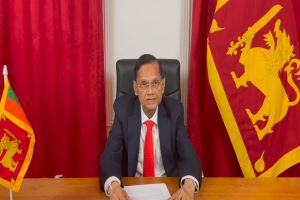
Mr. President,
Madam Secretary General and
Distinguished delegates,
It is an honour for me to address the high-level segment of the Conference on Disarmament, the world’s sole multilateral disarmament negotiating forum.
Mr. President as a member of the Conference on Disarmament since its inception, we take pride in its past achievements and recall its successes and those of its predecessor entities which led to the conclusion of landmark Conventions such as the Treaty on the Non-Proliferation of Nuclear Weapons (NPT), the Biological Weapons Convention (BWC) the Chemical Weapons Convention (CWC) and the Comprehensive Test Ban Treaty (CTBT). I would like to reiterate at the outset Sri Lanka’s long-standing policy against the possession development and use of all weapons of mass destruction; chemical, biological and nuclear. We remain a strong advocate of nuclear nonproliferation and disarmament in line also with the principles of the Non Aligned Movement in multiple fora in New York , Vienna , the Hague and in particular here at the Conference on Disarmament in Geneva.
Today, we realize more than ever before the importance of international cooperation and diplomacy to secure international security and peace. In addition, the current pandemic situation brings home the most pertinent question of whether a security regime based only on unprecedented expenditure on destructive weapons is the best measure to achieve sustainable human security. It is imperative that we realize the futility of conflict and an arms race that feeds into escalation of mistrust while the world looks forward to the benefits of cooperation and precious resources to progress on many fronts.
We welcome in this context the recent joint statement by the five permanent members of the Security Council (P5) affirming that ‘a nuclear war cannot be won and must never be fought’. We believe that this joint statement issued on a major global security issue in the already deteriorating international security context mirrors renewed hope and commitment of the nuclear weapon states as well as a recognition of the unimaginable humanitarian consequences of a nuclear catastrophe.
We look forward for concrete action by nuclear weapon states in line with the NPT goals of complete disarmament of nuclear weapons. We are disappointed about the slow progress in this regard here in the Conference of Disarmament as well as the inadequate progress on the disarmament pillar of the NPT contrary to the agreements in the package of measures agreed in 1995 , 2000 and 2010. While we are aware of the legitimate security concerns of states, we are not convinced that increasing as well as modernization of nuclear arsenals and nuclear deterrence arguments are the solution in this regard. We look forward to the NPT Review Conference now rescheduled for May this year to demonstrate momentum in the form of a substantive and balanced outcome document with concrete steps serving the three pillars of the NPT on disarmament, nonproliferation and promotion of peaceful uses as well as on the agreed package of 1995. Sri Lanka stands ready to work with other states for the success of the 10th NPT Review Conference.
As a non-nuclear weapon state, Sri Lanka underscores the importance of a legally binding instrument on unconditional negative security assurances which remains a commitment hereto unfulfilled.
Regarding Prevention of an Arms Race in Outer Space (PAROS), Sri Lanka’s longstanding position on the peaceful use of outer space and commitment towards prevention of militarization of outer space has been clear and consistent. As a country that has been presenting the traditional First Committee resolution on PAROS alternately with Egypt each year, we remain fully committed to the prevention of an arms race in outer space and keeping it free of conflict for the safety of the entire humankind. We consider the new Open-Ended Working Group (OEWG) on reducing space threats that is about to commence in Geneva as an opportunity to advance our discussions with a view to find convergences on critical issues. We earnestly hope that the deliberations in the OEWG will contribute towards substantive progress on a verifiable multilateral agreement on PAROS which we believe has been long overdue.
With regard to the use of advanced technologies in weapon systems, Sri Lanka follows closely the ongoing deliberations in Geneva on autonomous weapon systems and remains convinced that a legally binding treaty to ensure centrality of human control in weapon systems is an urgent necessity. We note with concern that window for collective action in this regard is fast closing. The prospects of these dangerous weapon systems falling into the hands of terrorist groups is a real and serious threat to international peace and security.
Mr. President, this august body should focus on its actual mandate on negotiations of legal instruments on disarmament and non-proliferation. We were not able to agree on a programme of work last year as it was the case for many preceding years of the Conference. We share the view that genuine political will is the key to end the stalemate that has paralyzed this critical body for decades. We urge all CD member states to show flexibility and true political will to rise above our differences this year to deliver our collective responsibility to humanity.
Thank you Mr. President.